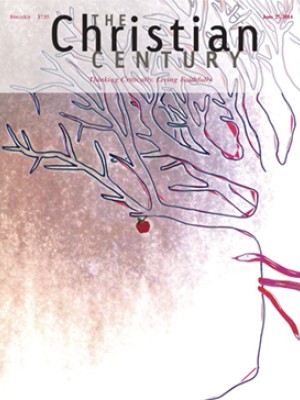The presence of absence: Grieving and believing
On the day my father died, he looked as run-down and parched as the tiny Nebraska farm he grew up on during the Depression. Just as the dust storms of his youth had stolen the thin, rich topsoil from their farm, so had the quiet storm of Alzheimer’s swept away his best thoughts from the landscape of memory. Nothing could grow or take root anymore in that barren place. And this drought would not end.
A week earlier, my two older brothers called and asked me to come up to St. Paul, where they live and where our dad was in a care center. It was time for hospice. My brothers had managed the day-to-day slog of dad’s mental decline for two years—the maze of doctors and caretakers and meds and how to pay for it all. A few months prior, when dad escaped his room and locked himself outside in his underwear in a snowy parking lot on a freezing January night, they moved him to a memory unit.
Read our latest issue or browse back issues.
That was a sad place. All the windows were locked and alarmed, and the entrance door required a digital code. Without the rudder of memory, my father and the nine residents in his unit all seemed adrift in a tiny boat on a wild, infinite sea—yet unconcerned about finding their way back to shore. Whenever I visited them for dinner, I wondered how I appeared to them: a dim light off in the distance toward which they might row for a few seconds? And I wondered what I would do, if it were me, and if I could still decide. That is, if I couldn’t recognize my family or friends, or remember what and who I loved, would I really want to be alive?
We didn’t know how long dad would live—a few days, perhaps. On the day he died, we all took turns sitting with him. That afternoon, I sat by his bed, swabbed his dried lips and mouth with a small blue sponge and stroked his face and arms. His eyes closed, his breathing unsteady; he could barely swallow. Yet he still knew the language of water and of my open hands. Sometimes he would startle awake for a minute out of his sleep and look at me with concern. I tried to comfort him but had no idea what those weary eyes could see.
So I just sat there in that little room with the gaunt shell of my father’s body and his last whispers of thought and tried to pray. But I’m not good at prayer, so my mind began to wander. I thought of the memoir I’d just finished reading: The Presence of Absence: On Prayers and an Epiphany, by Doris Grumbach. At age 81, Grumbach writes of an epiphany she had at 27 and describes her lifelong search to relive it, to rediscover the presence of God.
After long presuming that all “religious experience” was like her epiphany, she stumbles upon psychotherapist James Hillman’s idea that “absence is the first form of knowing.” Finally, she accepts the possibility of a God even without the “proof” she has been seeking.
Her search for proof didn’t interest me as much as the paradoxical title. While “the presence of absence” may describe God, it better describes Alzheimer’s, a disease that leaves a person physically present but mentally absent. And we had all been watching it take hold of Dad for years. The growing absence: the widening gaps between thoughts; the nonsensical unfinished sentences; the bawdy, rude comments to his nurses. Then, finally, he could no longer dress or feed himself, and his mind began to seem like an empty church: dark and cavernous yet expectant.
Dad was a minister, so he’d spent a lot of time in care centers like this one—doing what I was doing—sitting with his parishioners in their last hours. I wondered what he would have done if he were me. I put one hand on the warm dome of his skull and the other on his dry, stubbled face and cried. Mainly from grief, I think, but also from gratitude for how those last moments could sprawl into an entire life.
Then I placed my hand on dad’s chest and felt the rise and fall of a lung, and the other hand on his heart and felt the faint burble of an 88-year-old pump, and the limits of blood and flesh and bone, of body, and the limits of mind, of the electrochemical charges that create thought, emotion, memory, which got me wondering about spirit, and how these three parts of a person converge, or don’t—in life, and in death.
Somehow the idea of spirit turned me back to Grumbach and the presence of absence, and what Dad might have told her about her faith. How many times had I heard him say it: “Doubt is not the opposite of faith, but a part of it. The point of faith is not answers, but meaning. Live in the questions, in the mystery.”
The depth of that mystery first hit me when I was in eighth grade. One Saturday morning, in the autumn of 1974, I walked into my dad’s office at the Congregational Church in Maquoketa, Iowa, and told him I couldn’t be confirmed the next day in worship with the other kids. I was 14 and riding a river of hormones. My face was breaking out and my voice was breaking up, so I can imagine how Dad viewed my discernment process.
“Why not?” he asked. I told him I was unsure, that I might be one of those “egg-nostics,” and just couldn’t answer yes to all the required questions: Do you believe in God, the maker of heaven and earth? Do you accept Jesus Christ as your personal savior? Do you believe Jesus is the Son of God?
Dad was the confirmation teacher, and it was a small town, so everyone would know. None of the other kids were backing out. No one ever had. It would be embarrassing for Dad, which is why he was pissed off: “Damn it. Why did you wait until the last minute?” I said I didn’t know for sure. Then he said he thought I was taking the questions too literally. “How am I supposed to take them?” I asked.
We argued like this for a while, but then I reminded him about all the stuff he’d been teaching us. “What about ‘the prison of certainty’ and ‘the hermeneutic of suspicion’ and that ‘doubting Thomas’ guy?” I asked. At first he was defensive, but before long he came around, and pretty soon we were both laughing at the irony of the whole thing.
“Maybe the problem,” Dad said finally, “is that you were the only one who was listening.” The next day I sat in the front pew and watched while all the others were confirmed. No one seemed too concerned.
Then Dad stirred again in his bed, pulling me back to the present. His eyes opened and seemed less distant. He slightly turned his head toward me, barely squeezed my hand, and in an airy, labored whisper said “luf” or “luh” or “huv.” Or was it “love”? He said it twice, with much effort, and I sensed a faint spark of recognition, a presence. But who can know for sure? Then his eyes closed again, and he fell back asleep. A half hour later, my third brother, Ken, arrived from Iowa to relieve me, and I drove off. That night, after I arrived back home in Chicago, Ken called to say that dad had died.
A week later, while preparing a talk for the funeral, I wondered about my father’s last word to me. I’m not certain that it was “love”; I don’t have it on tape along with a linguistic analysis. But I want to believe it was. And belief is a different kind of knowing. There is no proof. It’s subjective, like most of our remembering. Our perception of our past lives is an ongoing act of interpretation, which involves the whole of our intellect, including the imagination.
I’ve had to learn this as a writer, but it was never more clear to me than while watching my father’s memory trickle away. The things he lost that mattered most were not the facts, not the provable or the certain, not the days of the week or his Social Security number or the number of congregants in the last church he served.
What mattered was the wild swirl of stories that he carried—that holy reservoir of images and moments, of love and loss—that told him who he was. Shucking corn on hot summer days until his hands bled and swimming in the Little Blue River for relief. Rushing home from the U. S. Navy at 19 to be with his dying father in his last days. Arriving at the University of Chicago Divinity School to begin studies and feeling like he’d landed on a different planet. Preaching a sermon against the war in Vietnam that would prompt such a backlash he would have to leave that church.
Just four stories, four moments among thousands. Yet all flow from one life, with its myriad turns and twists and winding streams of meaning, and will keep unfolding in anyone who knew my father. The stories don’t die.
The funeral was a month later on a sunny, hot June morning at the First Congregational Church of Iowa City, Iowa, where my parents had attended for many years. A dozen or so friends from Maquoketa made the 75-mile drive to say goodbye to their old pastor, to remember their shared lives. After the funeral there was coffee and sandwiches and many long conversations. But then our family and friends all got back in their cars and returned to their homes. And it was then that the waves of grief hit hardest. I’m not sure why. That line of Hillman’s from Grumbach’s book returned to me: “Absence is the first form of knowing.”
But I understood this “knowing” and this “absence” more in terms of art than religion. Perhaps Grumbach, an accomplished novelist, did too, or wanted to. I’m not sure. For me, writing at its best is a kind of spiritual discovery amid the absence, amid the vast desert of uncertainty that is art. Writing is an act of faith in creation.
So even though I still can’t answer yes to those questions that I ducked long ago in junior high, and “the presence of absence” is often an apt description of my religious belief, I can remember my father with words, with story. Words keep him present. And my last word is always the same as his to me. Love.






